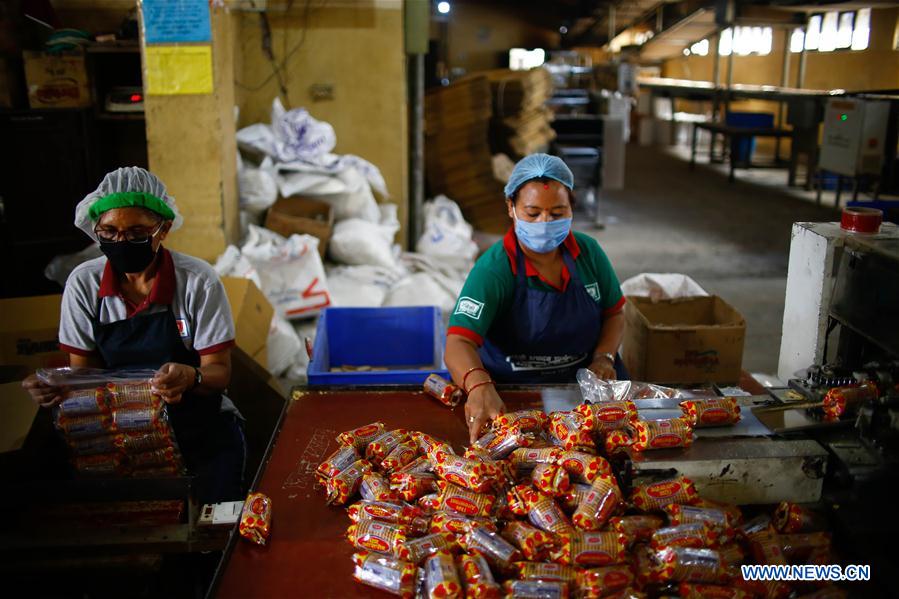
Two women work at a biscuit factory in Kathmandu, Nepal on May 8, 2020. Nepali industrialists and economists said that restoring the supply chain disturbed by the ongoing lockdown in Nepal would be crucial to resume operation of nearly four dozen sectors after the Nepali government on Wednesday relaxed the provisions of lockdown for them. (Photo by Sulav Shrestha/Xinhua)
KATHMANDU, May 7 (Xinhua) -- Nepali industrialists and economists said that restoring the supply chain disturbed by the ongoing lockdown in Nepal would be crucial to resume operation of nearly four dozen sectors after the Nepali government on Wednesday relaxed the provisions of lockdown for them.
In order to prevent the spread of COVID-19 pandemic, the Nepali government has been enforcing a nationwide lockdown since March 24, including suspending ground and air travels, shutting down shops and industries, except those related to essential goods and services.
With the economic cost of the lockdown increasing massively and the employment of thousands of Nepalis at stake, Nepal's cabinet on Wednesday decided to allow resuming operation of 44 sectors by following strict health protocol and in coordination with COVID-99 crisis management centres at federal and provincial levels.
Among the sectors opened for businesses include production, transport and sales of agriculture and livestock products; medical goods and services; operation of transport services for goods; continuation of development activities; production of industrial goods including construction materials, food items and export products; banking services and hotels and restaurants along the highways, among others.
"As when the pandemic comes to an end is uncertain, it was logical to run by ensuring necessary safeguards," Satish Kumar More, president of the Confederation of Nepalese Industries, a grouping of medium and large scale industries, told Xinhua on Thursday. "This will help save thousands of jobs."
However, he said that resuming operation of the industries alone would not be sufficient. "The government should be flexible on opening the shops as well by ensuring adequate safety measures," he said.
Since the lockdown began in late March, the Nepali government has only allowed shops related to medical goods and food items such as milk, foods and vegetables to partially open every day, while shops related to all other types of goods and services have not been allowed to open so far.
"How long can we store the goods in our warehouses without access to the market?" Pashupati Murarka, owner of Murarka organization, a leading business house of Nepal, told Xinhua on Thursday. Although the cabinet decision allowed a number of industries to resume operation, it has not clearly stated about how the industries could deliver goods to the market.
"The government should ensure the resumption of supportive industries and it should also ensure movement of workers and other employees to resume the industrial operation."
Senior economist Govinda Nepal told Xinhua on Thursday that the limited relaxation in certain sectors was needed to give some respites to the economy which is expected to see a meager growth due to the COVID-19 pandemic.
Last week, the Central Bureau of Statistics projected Nepal's economy to grow by 2.7 percent in this fiscal year 2019-20 against the target of 8.5 percent. The current fiscal year comes to an end in mid-July. Enditem